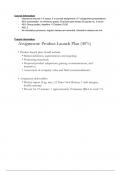Summary
International Marketing Complete Summary
- Course
- Institution
Complete summary for the course International marketing. Includes; - All lecture notes - All slide notes - Answers to all weekly self-test questions per lecture - Most important notes of paper (added to relevant slide sections) - Additional information on poorly explained concepts in class ...
[Show more]



